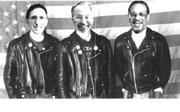DON’T TELL Curt Firestone that nobody’s running for Seattle City Council.
“I never changed my name, my name’s still Firestone, not Nobody,” jokes the candidate, who, on Monday night, announced plans to challenge incumbent City Council member Jan Drago.
But, aside from Firestone—who ran a courageous, if overmatched, race against City Council President Margaret Pageler two years ago—no viable challengers have yet surfaced for this year’s important City Council election. There are three other declared council challengers besides Firestone—activist E. Heath Merriwether, Internet jokester Cary Thomas, and the generously named Dakotta James Kanianthara Alex—but only Merriwether has reported any donations, and his $180 won’t even pay the filing fee. None have indicated which incumbent they plan to challenge. Another rumored candidate, Capitol Hill Community Council President Ann Donovan, has opted to skip this year’s races.
At this point, still seeking any competition whatsoever are incumbent City Council members Richard Conlin, Nick Licata, and Richard McIver.
They may not get it. “The whole political culture in Seattle is one of aversion to risk,” says political consultant Greg Dewar. “We make self-fulfilling prophesies out of these campaigns.” Dewar, who says he no longer bothers with city races, argues that a strong challenger could thrive in any council race, where incumbents are used to coasting to re-election. “Any incumbent can be beat with the right amount of effort put into it because of the way they run their campaigns,” he adds.
What’s keeping the candidates away? Let’s start with the fear of risk-taking. A big loss in your first run for office can make for a short political career. Plus, many challengers are afraid of the enemies they might make by running against a popular incumbent. Big deal, scoffs Dewar: “Someone might not pour you a cup of punch at the Christmas party.” But, in genteel Seattle, it’s a real factor.
Our system of electing council members doesn’t help. Seattle City Council members run citywide, rather than in more manageable neighborhood districts. “It’s not an easy process in this city,” says Firestone. “The current laws really do protect incumbency.”
Firestone cites a third factor: the recent council vote to raise the per-person contribution limit in city races from $400 to $600. Although the City Council claimed raising the limit would be an aid to challengers, Firestone argues that it simply expands the benefits of incumbency. The absence of challengers seems to favor his reading.
A fourth factor is the recent abundance of open seats—positions where the incumbent has opted not to run for re-election: Six of the last 10 council seats up for grabs have been open-seat races. Potential council candidates have just gotten out of the habit of challenging incumbents. But, a couple of elections without an open seat could make council wanna-bes desperate enough to take a chance.
After all, challenging incumbents is not unprecedented: Licata and Drago both lost open-seat races before winning their seats; Pageler twice challenged incumbents (Dolores Sibonga in 1987 and George Benson in 1989) before winning an open-seat race in 1991. Incumbents “can be defeated,” says Pageler, “but it takes a concerted campaign and name recognition that you’ve built over time to do that.”
That was Firestone’s theory two years ago when he challenged Pageler and took 33 percent of the vote. “I feel I paid, in essence, $60,000 [his total campaign budget] to create some name recognition,” he says. “That’s part of the reason I’m running now—two years from now, I would have lost some of that name recognition.” Would he shift races if an incumbent withdraws and an open seat becomes available? “Definitely,” he replies.
Ironically, Licata first entered the 1997 race as a challenger to incumbent Drago, later switching to an open seat after three council members stepped down to run for mayor. Licata, a strong critic of corporate welfare (the baseball stadium, subsidized downtown parking garages), chose to challenge Drago because of her support for these policies. “You can find a real winning candidate against an incumbent if they feel that there’s a burning issue that will resonate with the general public and that really motivates them,” he says.
So what issues are available for this year’s incumbent-killers? Matthew Fox, Charlie Chong’s 1996 campaign manager, says transportation could be just the thing. A candidate could focus on the City Council’s constant foot-dragging on the monorail, or the failures of Sound Transit, both of which would seem to point to a challenge of Council Transportation Committee Chair McIver. Last time McIver ran, however, he got a free pass—being opposed by a candidate who did not run a serious campaign.
Why does it matter, anyway, if people challenge incumbents?
“The public benefits from good, vigorous elections,” says Dewar. “We can blame the system or the media, but I think ultimately the voters have got to look at themselves and say, ‘Why am I accepting this?'”






